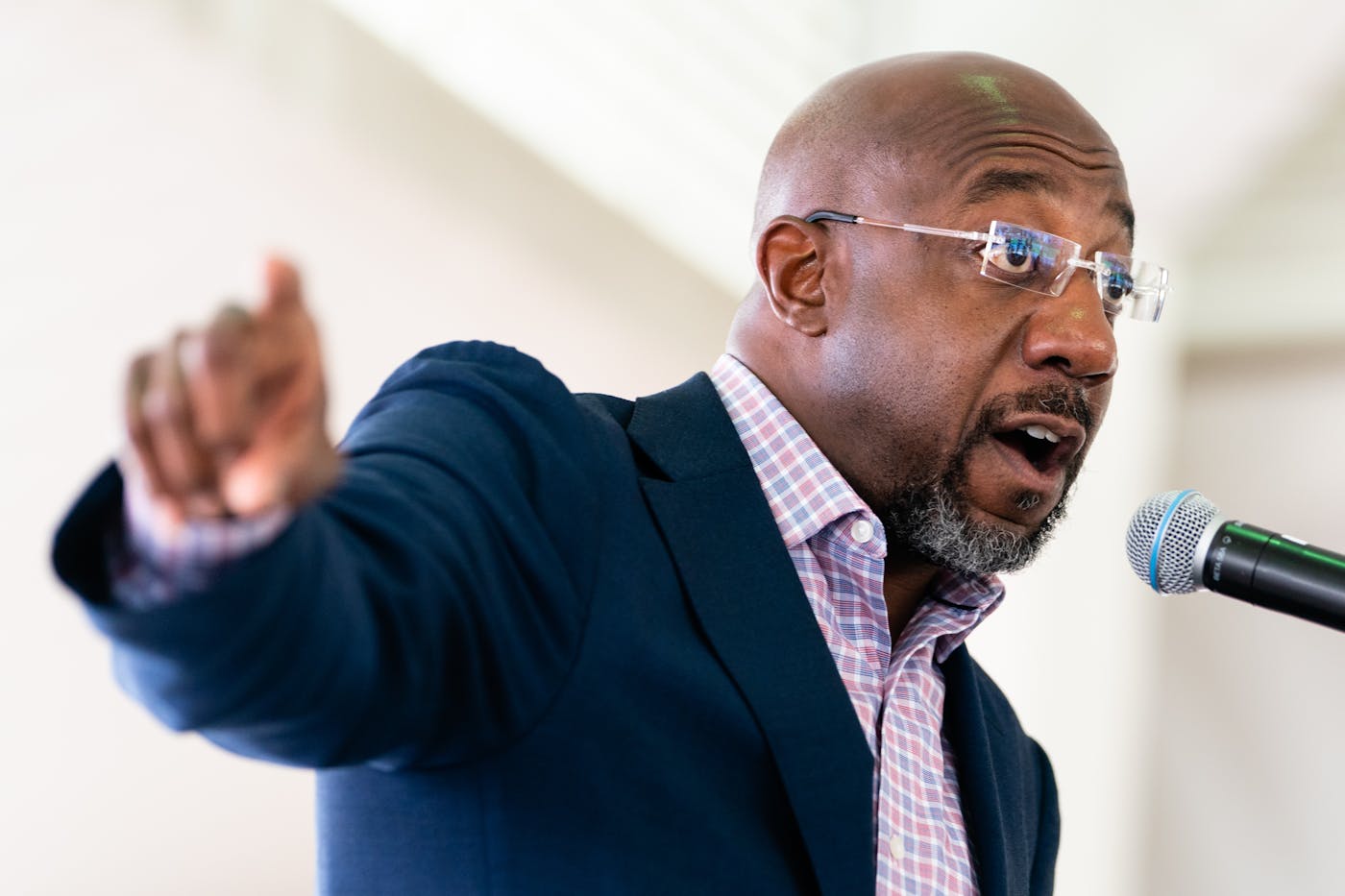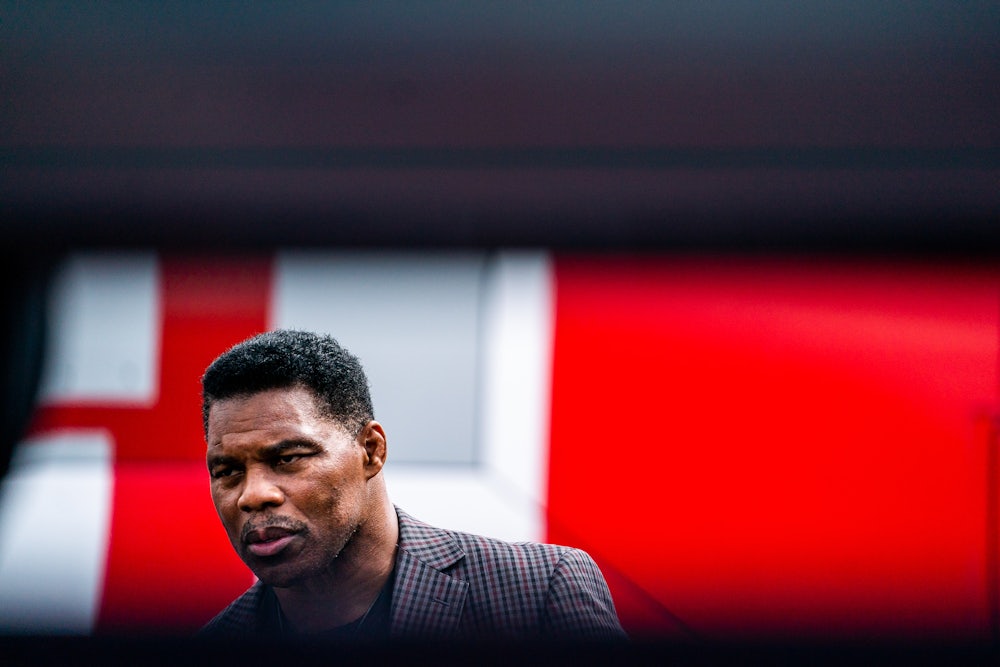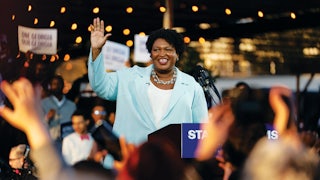Herschel Walker, Georgia’s Republican nominee for Senate, has confessed what some of the American electorate knows to be true: He is dumb. When reporters asked the former football star about an upcoming debate with incumbent Democratic Senator Raphael Warnock, Walker tempered expectations: “I’m a country boy. I’m not that smart. He’s a preacher. Warnock is smart and wears these nice suits. So, he is going to show up and embarrass me at the debate October 14, and I’m just waiting to show up and I will do my best.”
Warnock made history in 2020 when he defeated Kelly Loeffler to become the first Black senator to represent Georgia. His reelection fight, which polls show is a dead heat, is also historic: It’s the first time two Black men have faced off in a general election for a Senate seat in the state. The outcome will have major racial and political implications. A Warnock victory may help preserve Democrats’ control of the Senate, while a victory by Walker could have the opposite result—and add a second Black senator, alongside South Carolina’s Tim Scott, to Trump’s anti-democracy brigade.
Yet some have argued that race is not a factor in the contest because both candidates are Black. “Race doesn’t come into this race: Both Walker and Warnock are Black,” The New York Times’ Frank Bruni opined recently. What distinguishes them, he argues, is their quality as candidates: “The unbridgeable divide is between the two candidates’ credibility and coherence.… If Walker ekes out a victory in Georgia in November, it will suggest how very little candidate quality matters anymore. And it will have implications far beyond the Peach State.”
Bruni’s reasoning is anchored in a common misconception—among white observers, anyway—that race is only a factor in elections if one candidate is white and the other is Black. But race can indeed be a critical factor in elections between two Black candidates, as anyone who has truly paid attention to the Georgia battle would know: Walker was backed by the Republican Party to give cover for their anti-Black agenda, and he’s rewarded their support by running an anti-Black campaign.
As The Washington Post reported last week, “Many Republican operatives admit privately that Walker was backed by the party’s leaders at least in part because the GOP wanted a Black candidate to face Warnock, the first Black senator in Georgia’s history, who preaches at the pulpit once held by the Rev. Martin Luther King Jr.” The hope, of course, was that simply by being Black—and perhaps because of his former stardom as a University of Georgia running back—Walker could peel off just enough Black Georgians, who overwhelmingly support the Democratic Party, to swing the balance. But as a result, the party failed to do due diligence on the candidate. “A lot of [conservatives] said, ‘He’s Black, and he agrees with us,’ and I think that’s why people just gave him the benefit of the doubt,” a GOP strategist told the Post.
Black candidates can be, and often must be, surrogates of white supremacy to be relevant to a majority-white electorate. This is not true only of Black Republican candidates—New York City Mayor Eric Adams’s rhetoric on crime is a case in point—but it is more apparent on the right. And perhaps no politician is a better example of this than Walker, who has made his candidacy legible to Republican voters by repeating conservative talking points that downplay systemic racism.
In May, Walker began a speech at the Georgia Sports Hall of Fame with a joke: “I don’t know if you know this, but I’m Black.” He then asked the majority-white crowd, “Where is this racism thing coming from?” As the Times reported, he suggested that accusations of racism are used to silence people like his audience. While acknowledging he had been called a racial slur, he was unoffended because the animal to which he was compared was smart, and the Bible doesn’t distinguish between white and Black people. “The white members of the audience cheered,” the Times noted. “The few Black onlookers had a different reaction, wondering what race-blind Georgia he seemed to be referring to.”
This September, Walker’s campaign released an ad that accused Black Democrats of using race to stoke division. In the ad, Senator Warnock is quoted as saying, “America has a preexisting condition. It’s called racism.” Walker responds, “Senator Warnock believes America is a bad country full of racist people. I believe we’re a great country full of generous people. Warnock wants to divide us. I want to bring us together.”
In his 2009 memoir Walker wrote, “I never really liked the idea that I was to represent my people.” Indeed, Walker does not represent Black people. His campaign is not an insult to Black people but a tribute to the white electorate that is the lifeblood of his candidacy. For Walker, anti-Blackness is his great unifier, a tonic that is capable of subduing two seemingly opposing forces: white Trump voters and Black people. Walker was taught not to see race unless it’s through the aperture of anti-Blackness. Walker is blind to race, yet he co-signed racist tropes of the “absentee Black father” while having fathered children out of wedlock with multiple women.
On the merits, Warnock’s victory should come easy. He’s not a self-proclaimed dunce; he graduated cum laude from Morehouse and later earned two master’s degrees (one in divinity, one in philosophy) and a doctorate in philosophy from Union Theological Seminary. He’s a preacher at Ebenezer Baptist Church in Atlanta, the spiritual hearth of Martin Luther King Jr. He also has the advantage of incumbency.

And Walker is not unqualified simply because, by his own admission, he’s not very bright. His campaign has lied about Walker graduating from the University of Georgia. He lied about working for law enforcement. He has been accused of threatening to kill at least two women and accused of stalking another. The list goes on.
But Walker’s offenses are hardly disqualifying in a Republican Party that elected a president who is an admitted serial sexual predator. In this respect, at least, race is not a factor in his candidacy: Walker, who supports abortion bans with exceptions for rape or incest, is part of a GOP tradition of dismissing, and sometimes (in Trump’s case) even celebrating, violence against women. The fact that the party has not renounced Walker is further proof of how far right it has lurched.
This is not, however, merely a matter of Republicans no longer caring about candidate quality but of how deeply they care about preserving white supremacy. That’s why they elected Trump and why they nominated, and are sticking by, Walker. The fact that he is Black immunizes them, in their eyes, from accusations of racism—for they cannot possibly be racists if they vote for a Black man. This blindness to the complexities of race is shared by many liberals. Contrary to Frank Bruni, race is not only a factor in the Georgia Senate contest; it may well be the defining factor. Republicans have long weaponized race to preserve white supremacy, and enlisting Black candidates in that effort is neither contradictory nor self-exculpatory. In fact, it shows that Republicans understand, perhaps better than anyone, the bonding power of white supremacy—that one need not be white to perpetuate it.






